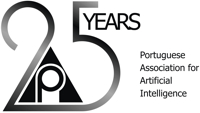COLA
Computational Logic with Applications
The integration of new complex intelligent systems requires more and more sound and appropriate foundations and tools, resulting in new problems and challenges for the computational logic practitioners. Computational logic has been widely used in complex applications in important areas such as the Deductive Databases, Natural Language Processing and Program Analysis, and more recently on the Semantic Web and related Web Tools. These novel applications have exposed the limits of existing approaches, showing the need for research on better languages and more sophisticated implementations of reasoning systems. The COLA thematic track of EPIA 2009 covers the broad area of Computational Logic and its applications, with special interest on topics related with new formalisms, environments, and applications. A list of non-exhaustive topics can be found below.
Topics of Interest
- Logic based knowledge representation and applications.
- Declarative semantics of rule languages and applications.
- Program Analysis, Program Transformation, Validation and Verification, Debugging, Profiling.
- Implementation of reasoning systems, in particular logic programming, contextual logic programming and tabling systems.
- Abductive and Inductive Logic Programming
- Ontologies, Description Logics and integration with reasoning systems.
- Reasoning with incomplete and uncertain information, including non-monotonic reasoning as well as probabilistic and fuzzy logic programming formalisms.
- Reasoning on the Semantic Web.
- Applications: Deductive Databases, Data Integration, Natural Language, Semantic Web, and Web Tools.
Organising Committee
- Carlos Viegas Damásio, Universidade Nova de Lisboa, Portugal
- Fernando Silva, Universidade do Porto, Portugal
Contact
cd[at]di[.]fct[.]unl[.]pt
Program Committee
- Bart Demoen, K. University of Leuven, Belgium
- David Warren, University of Stony Brook, USA
- Enrico Pontelli, New Mexico State University, USA
- Frank Pfenning, Carnegie-Mellon University, USA
- Gopal Gupta, University of Texas at Dallas, USA
- Gregory Wheeler, CENTRIA - Universidade Nova de Lisboa, Portugal
- Grigoris Antoniou, FORTH and University of Crete, Greece
- Inês Dutra, Universidade do Porto, Portugal
- José Júlio Alferes, CENTRIA and Universidade Nova de Lisboa, Portugal.
- Manuel Ojeda Aciego, Universidad de Málaga, Spain
- Nuno Silva, ISEP, Portugal
- Pascal Hitzler, University of Karlsruhe (TH), Germany
- Paulo Gomes, Universidade de Coimbra, Portugal
- Priscila M.V. Lima, Universidade Federal do Rio de Janeiro, Brazil
- Salvador Abreu, Universidade de Évora, Portugal
- Terrance Swift, CENTRIA - Universidade Nova de Lisboa, Portugal
- Umberto Straccia, ISTI, CNR, Italy
- Vítor Santos Costa, Universidade do Porto, Portugal

